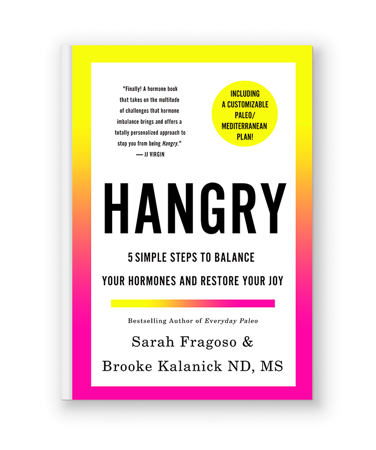
We think of blood sugar problems are reserved for those with Diabetes or its cousin, Metabolic Syndrome X, but the truth is we are all managing blood sugar swings every minute.
This is system is controlled by 2 main hormones: cortisol and insulin (glucagon and epinephrine also play a role) that are in sort of a tug of war to keep you balanced out. Cortisol’s main job is to get blood sugar up by pulling from your fuel reserves and insulin’s main job is to lower it back down after cortisol has kicked in or of course, after you eat.
Get you FREE copy of my Guide To Lab Testing & Your Hormones
This guide covers hormonal testing and thyroid patterns and will show you how to suss out the Hormonal Dealbreakers of inflammation, anemia and blood sugar problems.
Get Your Free Lab Guide HereCommon blood tests from your doctor give insight as to how well this system is working, but on an hour to hour basis your symptoms will tell you quite a lot. Why does this matter? Tightly controlled blood sugar keeps your brain and blood vessels healthy, your energy levels and mood even, and doesn’t cause undue stress on either the cortisol or insulin system – which when taxed over time will lead to bigger health problems.
Here are very simple clues to how much your blood sugar is swinging:
If your blood sugar is rising too much after meals you’ll notice: Fatigue after eating. Craving for sugar or carbs after eating. Eating sweets or carbs doesn’t relieve the craving. Ravenous appetite. Difficulty losing weight. Increased thirst and excessive urination.
If your blood sugar is dipping too low between meals you’ll notice: Fatigue between meals and feeling energized after eating. Difficulty waking in the morning. Frequent waking in the night, often feeling very alert or even hungry upon waking. Dizziness when standing up quickly. Salt cravings. Afternoon headaches or low energy.
What Does This Mean For Fat Loss?
Whether you’ve skipped a meal , gone several hours without eating or got really stressed out – your blood sugar will rise thanks to your stress hormones cortisol and adrenaline. These stress hormones pull from stored sugar (called glycogen) and also from fat stores – and if you’re really stressed out they will pull from protein stores, aka your lean muscle mass.
So if you’re prone to skipping breakfast, missing snacks or are other wise under a lot of stress (this includes heavy training) then you are prone to losing muscle mass and having a hard time shedding fat.
Now, along comes insulin.
Whether your blood sugar rises due to stress hormones or because you just ate a meal, insulin is released in order to get liberated glucose into your cells. Do this often enough or in large enough amounts (i.e. eating too many starchy carbs) and your body stops heeding insulin’s message.
When this happens your body becomes insulin resistant meaning you need more and more insulin to get your glucose out of the blood and into your cells.
The more insulin you have around the more often, the fatter you get – and of course the harder time you have losing the fat you already have.
There are a lot of hormones at play when it comes to losing fat, and they are all pretty fancy and sexy sounding: testosterone, growth hormone, glucagon, etc.
Order Hangry right now!
If you’ve ever felt like a Hangry B*tch and are ready to balance your hormones and restore your joy in just 5 simple steps then Hangry is for you!
GET YOUR COPY NOW
Among the most overlooked aspect of fat loss, perhaps because it’s not so fancy or cutting edge, is blood sugar control. Dial this one in and you’ll have more even energy, better workouts, better sleep and easier fat loss.
To keep your blood sugar even throughout the day, follow these simple guidelines:
- Eat every 3-4 hours. Balance meals with protein and lots of veggie fiber (greens, bell peppers, cucumbers, asparagus, etc)
- Avoid sugar (i.e. candy) and simple carbs such as breads, pastas, white rice, crackers, pastries, etc. And especially don’t eat these types of foods alone – have a protein, fiber or fat choice with them.
- Do not let yourself get irritable, lightheaded or shaky between meals. Be prepared with protein based snacks like hard boiled eggs, or healthy fat based snacks like nuts so that you aren’t relying on simple carb snacks like energy bars or pastries.
- Avoid getting sleepy after eating by counting your starchy carb bites (starchy carbs include whole grains, beans, legumes, potato, sweet potato, pumpkin and other squash, as well as fruit). The range is 4 to 14 bites and you need to find your unique carb tolerance that keeps your energy between meals up but does not leave you sleepy after eating.
If you have difficulty losing weight or have a condition called insulin resistance or diabetes start on the low end with 4-6 bites per meal. If you are an athlete or have greater demands for energy start closer to 10 bites. Experiment until you know what works for you – the bite system is great because there’s no measuring cup! Use sleepiness post meal as your guide.
Order Hangry right now!
If you’ve ever felt like a Hangry B*tch and are ready to balance your hormones and restore your joy in just 5 simple steps then Hangry is for you!
GET YOUR COPY NOW
SaveSave
